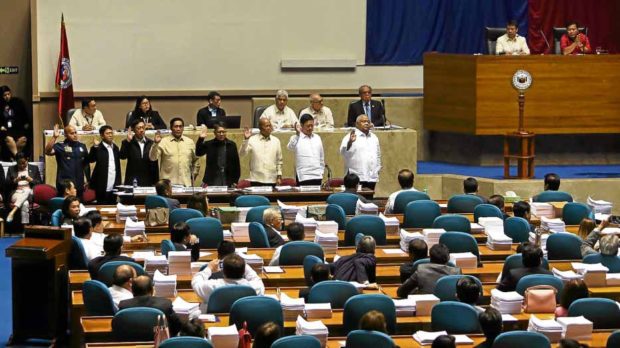
OVERWHELMING APPROVAL Legislators overwhelmingly approve President Duterte’s request for a one-year extension of martial law in Mindanao during a joint session of the Senate and the House of Representatives on Wednesday. Appearing to explain the request are several Cabinet members and security officials. —LYN RILLON
Despite warnings from opposition lawmakers that extending martial law in Mindanao was unconstitutional and expressions of fear that such a move could be a prelude for President Duterte to declare martial law throughout the country, Congress voted overwhelmingly on Wednesday to approve his request to extend military rule in the war-torn region by a year.
Sen. Francis Pangilinan, president of the opposition Liberal Party, rejected the martial law extension without a clear constitutional basis.
“We will be in danger of becoming the monsters that we seek to defeat, those who have no regard for law, order or respect for the Constitution,” Pangilinan said.
Senate Minority Leader Franklin Drilon said extending martial law was unconstitutional because “there are only threats at this point” and “actual conflict is the basic foundation for the continued imposition of martial law.”
Buhay Rep. Lito Atienza of the House minority bloc said extending the proclamation even as the basis—the siege of Marawi City by Islamic State-inspired terrorists—was now gone would “circumvent” the Constitution’s intention to limit martial law to 60 days.
More extensions
“If we allow an extension of one year, it could be extended to another two years, then another three years, contrary to the intention of the framers . . . that never again should any President be allowed to utilize martial law indefinitely,” Atienza said.
But after only four hours of deliberation, the joint Senate-House of Representatives session voted 240-27 to extend military rule and suspension of the privilege of the writ of habeas corpus across Mindanao through the end of 2018.
The votes were broken down as 14-4 for the Senate and 226-23 for the House. Mr. Duterte’s allies control an overwhelming majority in both chambers.
The four dissenters from the Senate were Pangilinan, Drilon, Bam Aquino and Risa Hontiveros, all from the minority bloc.
The senators who voted to grant Mr. Duterte’s request were Senate President Aquilino Pimentel III, Senators Tito Sotto, Sonny Angara, Nancy Binay, JV Ejercito, Sherwin Gatchalian, Richard Gordon, Gregorio Honasan II, Panfilo Lacson, Loren Legarda, Grace Poe, Ralph Recto, Joel Villanueva and Juan Miguel Zubiri.
A breakdown of the votes by House members was not available as of press time.
This was the second extension granted by Congress, although it would take effect for a longer period than the previous extension of roughly five months (until Dec. 31, 2017) granted in a July 22 special joint session.
Siege of Marawi
The imposition of martial law under Proclamation No. 216 was initially supposed to last 60 days, as mandated by the 1987 Constitution, from May 23 to July 22, after the IS-inspired Maute group terrorists and Abu Sayyaf bandits laid siege to Marawi City.
The siege ended on Oct. 23, but Mr. Duterte, in his request for another extension, reasoned out that remnants of the defeated groups were trying to reform by actively recruiting Muslim youths.
He also raised the bogey of the 48-year-old communist insurgency for the first time.
Ahead of the voting, Executive Secretary Salvador Medialdea took pains to explain: “We do not ask for an unlimited martial law. What we are seeking is an unlimited peace.”
Medialdea said that of the Moro rebels in the government’s martial law arrest orders, 185 remained at large and “in all probability are presently consolidating their forces.”
He added that “Turaifie group,” led by Esmail Sheikh Turaife, said to be the potential successor to slain Abu Sayyaf leader Isnilon Hapilon as “emir” of the IS in Southeast Asia, had been monitored as “planning to launch bombings, possibly in Cotabato.”
Red, Moro threats
Medialdea claimed that amid the Marawi violence, the communist New People’s Army “took advantage of the situation by intensifying their decadeslong rebellion” and committing at least 385 atrocities that resulted in the death of 41 government troops and 23 civilians.
He also cited violent acts blamed on the Bangsamoro Islamic Freedom Fighters and the Abu Sayyaf.
But many of the 28 debaters expressed doubt that an “actual” rebellion, as required by the 1987 Constitution, was taking place to justify the extension of martial law past the heat of the Marawi conflict.
The martial law administrator, Defense Secretary Delfin Lorenzana, cited the “active recruitment” of new Moro fighters, saying: “The rebellion actually has not stopped. It has moved to another place.”
Deputy Executive Secretary Menardo Guevarra repeatedly invoked the Supreme Court’s July 4 decision upholding Mr. Duterte’s proclamation of martial law.
Citing the tribunal’s decision, he said a “state of rebellion consists of many acts and not simply based on isolated firefights.”
Guevarra pointed out that nothing in Section 18, Article 7 of the Constitution explicitly limited the period of martial law. —WITH A REPORT FROM AP